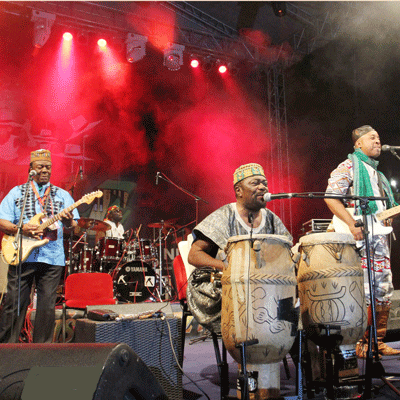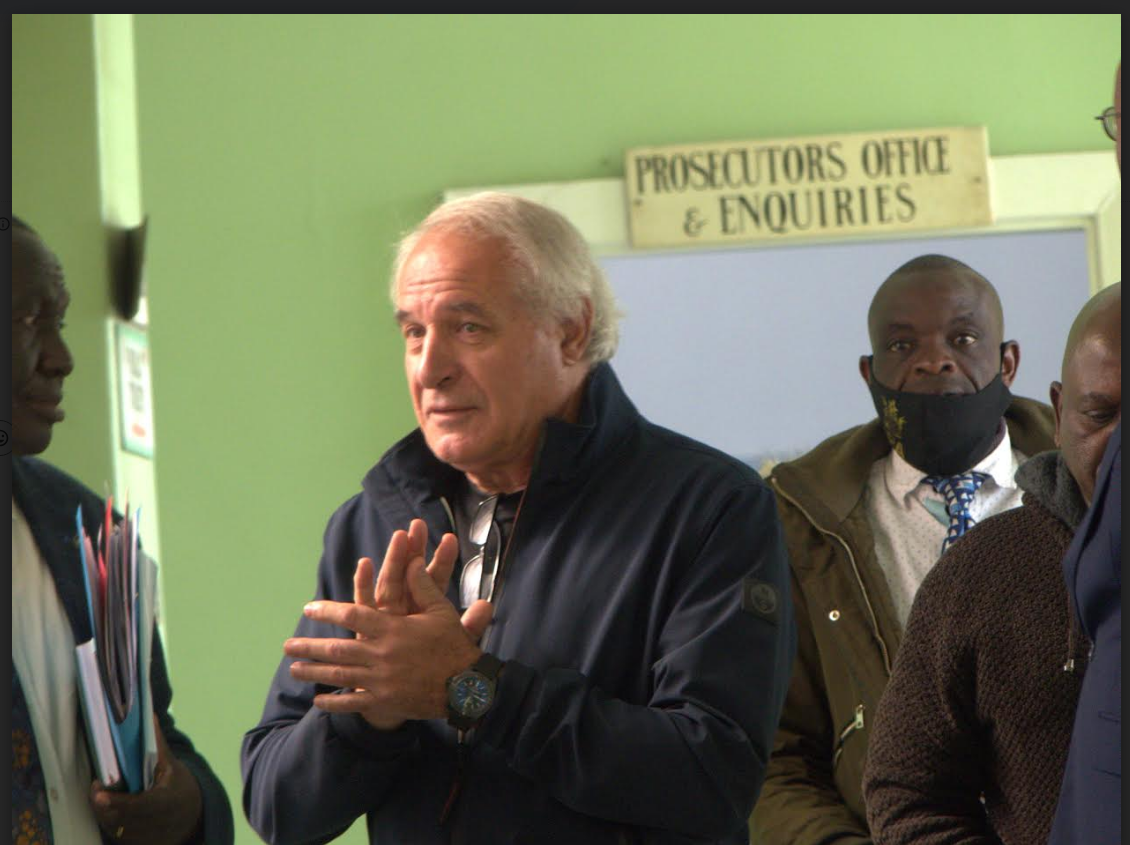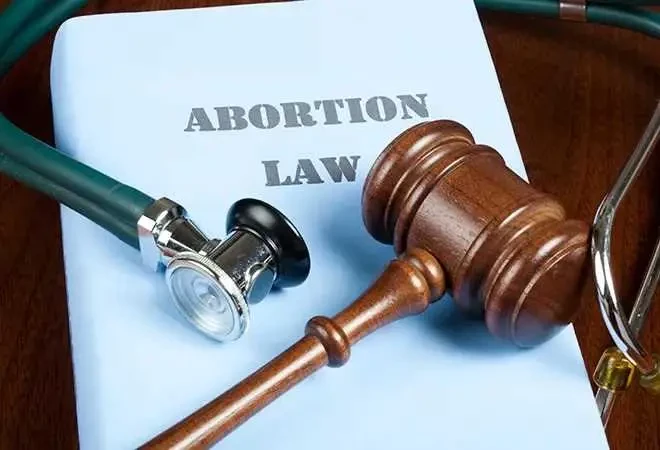
in the groove:with Fred Zindi
In 1985, businessman Billy Tanhira of Tanhar Agencies and Europium Star Investments approached me and asked if I could help him venture into music promotion. He was interested in bringing to Zimbabwe a popular British-based kids’ group known as Musical Youth who had recently topped the charts with the hit Pass The Dutchie.
He asked me if I had any contact with the group. I told him I did not have the contacts but knew people who could possibly have those contacts. I telephoned Brinsley Forde of the group Aswad and he said he couldn’t help. I then tried King Sounds of the Israelites who was in touch with Frederick Waite, the father of two youths in the group. He said he would send the number to me the next day, but that also failed. Tanhira then suggested that we go to Birmingham where Musical Youth were based and talk to them directly.
The following week, we were on British Airways off to Birmingham. On arrival at Heathrow Airport we decided to spend one night in London while making an appointment with MCA Records to see Waite. We went to Birmingham the next day and met with Waite in Edgbaston. His words were: “Zimbabwe is one country we all looked forward to visiting one day, but unfortunately, the band split up only two months ago. Dennis Seaton, the lead vocalist, has left the group.” We were disappointed.
Although dispirited, after a long discussion, Tanhira said to me: “We cannot go back to Zimbabwe empty-handed. After all, I told my friends and partners back home that we are going to bring a band from Britain. So, let’s look for an alternative. Can you think of alternative artistes we can choose from?”
Reggae music was the in-thing in Zimbabwe at the time. British-based reggae artistes who were hot at the time included Maxi Priest, Black Slate, Aswad and Misty-in-Roots. The latter two had just toured Zimbabwe, so we tried to get in touch with Maxi Priest. He was said to be on a tour in Europe. Black Slate had also just split up. We ran out of ideas.
However, as we were walking down Oxford Street in London, we bumped into Daku Adams, aka Potato, of Osibisa Band. I had interacted with him and the group Osibisa on several occasions before. I introduced Tanhira to Potato and Tanhira immediately suggested that we take the band to Zimbabwe. I explained to him that Osibisa were not a reggae band, but were also popular after their hit Woyaya had made the charts. Tanhira said that these would do as they were also known in Zimbabwe. Potato referred us to Teddy Ossei who was the saxophonist and band leader of Osibisa.
When we met Ossei the next day, we signed contracts and promised him that we would send a deposit for three performances in Harare, Mutare and Bulawayo. Then we flew back to Harare to plan the logistics.
- Chamisa under fire over US$120K donation
- Mavhunga puts DeMbare into Chibuku quarterfinals
- Pension funds bet on Cabora Bassa oilfields
- Councils defy govt fire tender directive
Keep Reading
The following week after our return from Britain, we roped in Mike Mhundwa who I had worked with during Aswad’s visit to Zimbabwe. The three of us went to the Ministry of Youth, Sport and Recreation to hire the only PA system in the country which had enough power output of 40 000 watts capable of delivering enough decibels to crowds of more than 5 000 people in the three stadiums we expected to stage the Osibisa concerts. We asked Wiseman, a sound engineer, to assist us in rigging the PA system.
At the ministry, we had no problems at all in securing this hire. Dumisani “Abraham” Maraire (Chiwoniso’s father) was in charge of this side of business. We signed the contract for the hire of the PA system . We put our signatures to the PA hire form and Maraire also put his signature to the form. He gave us our copy of the contract. We paid for the hire and that was the end of business for that day. The first concert was to be held on a Saturday afternoon at Sakubva Stadium in Mutare. We were told that we could only pick up the PA system from the (now defunct) Ministry of National Supplies, which was under the then minister Simbi Mubako, in Coventry Road on the Friday.
On the day, Mhundwa and I went to the ministry using one of the Mhundwa Transport trucks in order to transport the PA system first thing the next morning for a concert scheduled to start at 2pm. Tanhira had gone to the airport to pick up members of Osibisa and to arrange their accommodation. We later met at their hotel in the evening.
Around 5pm on the Friday, Tanhira received a phone call from Maraire asking him to cancel the collection of the hired PA system as the Ministry of Youth had changed its mind. Apparently another artiste, Jimmy Cliff, who had just completed a show in Lusaka, Zambia, was in town and Uzziel Mankola, who also worked with the ministry, had persuaded Jimmy Cliff to stage a rushed charity show in Bulawayo. Their only problem was how to get the PA system they had hired to us for the Osibisa concerts to do the Jimmy Cliff concert in Bulawayo. Tanhira told them that we had already collected the PA system and it was on its way to Mutare.
Mankola could not buy this. He said to Maraire: “This is our PA system and we are the government. Nobody tells us we can’t have our property when we want it!” The next morning we left for Mutare in three cars with members of Osibisa. We took two members of the band in each car except for Mhundwa who took three. Tanhira travelled with Teddy Osei and Potato. Mhundwa travelled with the bass player, the keyboardist and the lead guitarist. In my car was the drummer, Sol Armafio, and the trumpeter, Mac Tonto, and we laughed at how ridiculous we thought the ministry had been by asking us to return the PA system they had hired to us.
When we reached Mutare, Wiseman started working at Sakubva Stadium where he connected the system. At 12 noon, the band was ready for a sound-check. They did this for one hour before we broke up to go to Manica Hotel for lunch.
While having lunch, some kid came to us and told us that there was an emergency at the stadium and we should rush back. Mhundwa and I decided to go there while leaving the rest of the team enjoying their lunch. In the stadium we were surprised to see a helicopter which had landed there with Maraire, Mankola and three policemen. One of the policemen, an Assistant Inspector Moyo, addressed me very aggressively: “You are under arrest. You are charged with stealing government property — this PA system. We are taking it by helicopter to Bulawayo now and you are going to be in the cells until you appear in court on Monday.”
I asked him: “Where and how did we steal the PA system? Can you explain to us why we would advertise a concert in Mutare over the last three weeks without making sure that we have put the right logistics in place?”
Inspector Moyo came again: “That is not my business. My business is to take this PA system from you and the courts will sort you out.”
Music fans had begun to gather outside the stadium, ready for the concert. We did not know whether to let them in or not because of this dispute. Fortunately, I had the signed contract in my car. I showed it to Inspector Moyo and pointed at Maraire, then uttered: “Ask this man if that is not his signature on this contract. Also ask him if we also stole the letterhead on which the contract is written.”
Inspector Moyo was embarrassed. He looked at the contract and read it slowly in disbelief. He then turned to Maraire and said: “My friend, this is a civil matter. You misinformed me that these people had broken into government premises and stole the PA system. You did not mention a signed contract which I am discovering for the first time now. We assigned our special unit to give us a helicopter as there was an urgent criminal job to be undertaken, wasting government resources. Mr Zindi, my apologies to you.”
Apparently Maraire wanted the helicopter so that they could fly the PA system to Bulawayo where Jimmy Cliff was waiting to do a concert. The police were used to put fear into us so that we would surrender the PA system. We stood our ground. The team left for Bulawayo empty-handed. I was later told that the Jimmy Cliff concert went ahead, but the sound quality was poor as the ministry eventually hired a smaller PA system from Amakhosi in Bulawayo. Such is life! l Feedback: frezindi@gmail.com










